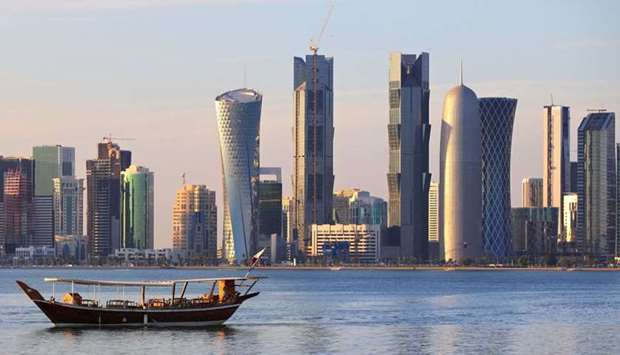Qatar is the highest ranking country in the Gulf Cooperation Council region in the 2020 FM Global Resilience Index, which is the definitive ranking of nearly 130 countries by the resilience of their business environments.
Qatar topped the region with a country rank of 27; country score of 81; economic score of 100; risk quality score of 59.8 and supply chain score of 60.
No other GCC country ranked in the index had figured in the top 49 in the 2020 FM Global Resilience Index.
“High-ranking countries in 2020 FM Global Resilience Index are well positioned to foster post-pandemic business recovery. The annual ranking of business environments informs smart decisions around pandemic-disrupted operations and supply chains,” points out FM Global, one of the world’s largest commercial property insurers, which published in the annual index.
The index provides companies with “objective” information about countries’ economic, risk quality and supply chain resilience – factors that create a springboard for businesses working to recover from the pandemic.
“When recovering after a crisis like Covid-19, resilience should be a key consideration for people, countries and businesses,” said Adriano Lanzilotto, operations vice president and client service manager for FM Global’s London operations.
“The 2020 FM Global Resilience Index provides a strong indication of how a country’s business environment may fare during the recovery phase, and how quickly organisations in that country might be able to bounce back from the economic damage caused by Covid-19. This insight can be vital for making significant decisions as they establish or relocate facilities, expand supply chains and engage with new markets.”
In addition to outlining the post-pandemic business landscape, the FM Global Resilience Index stands as a “dynamic” reminder that conventional business risks – flood, cyberattack, fire, hurricanes, earthquakes, oil shocks and political upheaval – continue to threaten operations and overall value.
“Unfortunately, a devastating global situation like Covid-19 does not stop other disasters from occurring,” said Lanzilotto. “With this in-mind, it is critical that businesses are diligent and make use of data-driven risk-and-resilience analysis, coupled with appropriate engineering-led loss prevention, to preserve a company’s value and growth opportunities throughout these difficult times,” he said.
The index’s top-ranked regions (in descending order) are Norway, Switzerland, Demark, Germany, Sweden, Finland, Luxembourg, Austria, Central United States and Eastern United States (both the US and China comprise three regions with differing natural hazard exposure).
The bottom 10 countries in the 2020 Resilience Index overall (in descending order) are Nicaragua, Nepal, Mali, Mozambique, Iran, Lebanon, Chad, Ethiopia, Venezuela and Haiti.
No other GCC country ranked in the index had figured in the top 49 in the 2020 FM Global Resilience Index.
“High-ranking countries in 2020 FM Global Resilience Index are well positioned to foster post-pandemic business recovery. The annual ranking of business environments informs smart decisions around pandemic-disrupted operations and supply chains,” points out FM Global, one of the world’s largest commercial property insurers, which published in the annual index.
The index provides companies with “objective” information about countries’ economic, risk quality and supply chain resilience – factors that create a springboard for businesses working to recover from the pandemic.
“When recovering after a crisis like Covid-19, resilience should be a key consideration for people, countries and businesses,” said Adriano Lanzilotto, operations vice president and client service manager for FM Global’s London operations.
“The 2020 FM Global Resilience Index provides a strong indication of how a country’s business environment may fare during the recovery phase, and how quickly organisations in that country might be able to bounce back from the economic damage caused by Covid-19. This insight can be vital for making significant decisions as they establish or relocate facilities, expand supply chains and engage with new markets.”
In addition to outlining the post-pandemic business landscape, the FM Global Resilience Index stands as a “dynamic” reminder that conventional business risks – flood, cyberattack, fire, hurricanes, earthquakes, oil shocks and political upheaval – continue to threaten operations and overall value.
“Unfortunately, a devastating global situation like Covid-19 does not stop other disasters from occurring,” said Lanzilotto. “With this in-mind, it is critical that businesses are diligent and make use of data-driven risk-and-resilience analysis, coupled with appropriate engineering-led loss prevention, to preserve a company’s value and growth opportunities throughout these difficult times,” he said.
The index’s top-ranked regions (in descending order) are Norway, Switzerland, Demark, Germany, Sweden, Finland, Luxembourg, Austria, Central United States and Eastern United States (both the US and China comprise three regions with differing natural hazard exposure).
The bottom 10 countries in the 2020 Resilience Index overall (in descending order) are Nicaragua, Nepal, Mali, Mozambique, Iran, Lebanon, Chad, Ethiopia, Venezuela and Haiti.


